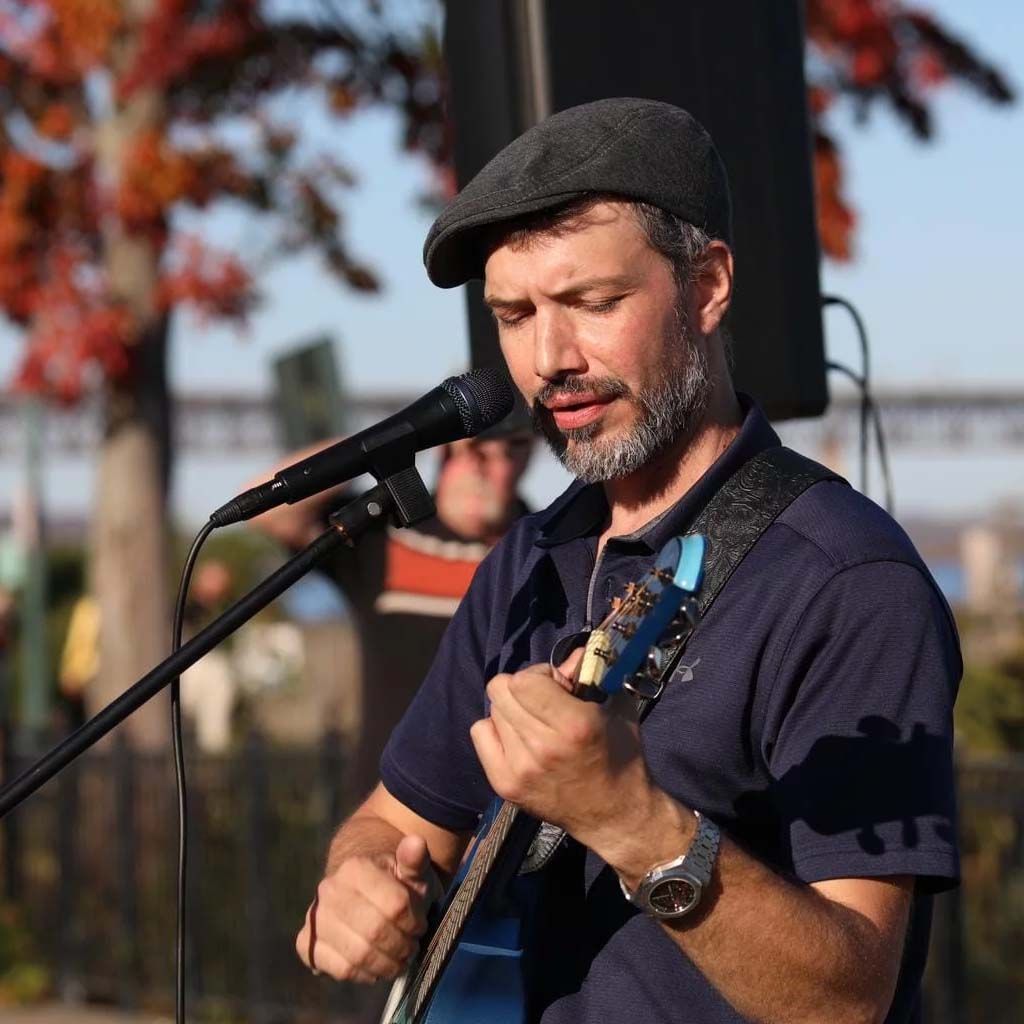
A Sukkot Celebration That Defied All Odds
Sunday, October 20, 2024 – Newburgh Waterfront, New York
By the grace of Hashem, Almighty God, everything aligned perfectly that Sunday for a public Sukkot celebration like no other. The late October weather was unusually mild, gifting us with a gentle breeze and clear, crisp skies—ideal conditions for a joyous outdoor event along the Newburgh Waterfront’s bustling boardwalk. Families with strollers, couples hand-in-hand, dog-walkers, and curious onlookers took their usual weekend stroll, only this time, they encountered something unexpected.
There it was: a pop-up sukkah constructed from metal framing, tarps, and natural branches for a roof. A bright yellow sign declared, “Happy Sukkot!” Passersby paused, intrigued by the structure’s purpose. One pair looked to each other, whispering:
“‘Sukkot’—some kind of Jewish holiday?”
“I guess so,” the other mused, still puzzled.
As I tuned my guitar in front of the makeshift stage, a gentleman approached and asked, “Hey man, what’s this all for?” In that moment, I recalled how Sukkot was first explained to me many years ago: this holiday commemorates the booths—temporary dwellings—that our ancestors lived in during their journey through the desert. It’s a time to celebrate protection, unity, and gratitude under Hashem's (God’s) watchful eye. With that in mind, I did my best to give him a snapshot of Sukkot’s meaning. “This isn’t just for Israelites,” I told him. “We’re celebrating out here in the open so anyone can join in the festivities!”
Truthfully, these public events can go either way. Sometimes no one shows up, other times they become a massive hit. Far from the established Jewish hubs of larger cities, communities like the one in Newburgh are lovingly nurtured by Shluchim—emissaries of the Lubavitcher Rebbe—like Rabbi Shmuel Serebryanski and his wife, Rebbetzin Rivka Serebryanski. They’ve chosen this unique waterfront venue to bring Jewish tradition to life, sharing Sukkot with everyone, Jew and non-Jew alike, at a time when the world’s eyes are often fixed on the Jewish people with misunderstanding or prejudice. Yet here they were, standing proud, determined, and warm-hearted, encouraging public expressions of Jewish joy and resilience.
To my delight, a large number of Jewish community members did show up. They didn’t just drop in and leave—they stayed. Some of them lingered long after my scheduled set ended, well into the event’s extended festivities. Their presence alone was heartwarming, but what truly touched me was when two Muslim passersby stopped to show support. They expressed solidarity with their Jewish “cousins,” as they put it, recognizing that both of our peoples are children of Abraham. In a world often divided by fear and misunderstanding, this moment of friendship was the ultimate victory over hate.
The music itself brought everyone closer. I decided to include a special piece in my performance—“The 9th Man,” a nostalgic and story-filled song originally featured on the iconic “Journeys” album by Abie Rotenberg and sung by my father, Moshe Yess, of blessed memory. This melody transcends time and place, weaving a tale that resonates with so many. Mentioning baseball teams—the Yankees, the Dodgers, and the Mets—all in contention during one improbable season, where all three teams were coincidentally in the playoffs at the same time. The song stirred memories and pride. A ripple of excitement spread through the crowd as the familiar notes filled the air. Before I knew it, one enthusiastic attendee jumped up and danced right in front of the stage, lifting the energy even higher. I’ll be honest: I wasn’t expecting that kind of joyful outburst, but it was beautiful and humbling.
Looking out at the smiling faces, at the Sukkah standing boldly on the waterfront, at neighbors and strangers learning about each other and sharing in the holiday’s sweetness, I couldn’t help but feel immense gratitude. Jewish pride was palpable in that moment. We were unapologetically celebrating our heritage in a public space, without fear—just pure, unfiltered joy. As the event wound down, words of appreciation poured in. People thanked the Rabbi for bringing authentic Jewish life to their community. They congratulated the Rebbetzin for her warmth and hospitality. I, too, felt deeply honored to have shared my music and my story with them.
Rabbi Shmuel and Rebbetzin Rivka Serebryanski succeeded in turning what could have been a subdued, uncertain afternoon into an extraordinary display of unity and Jewish pride. Their dedication, their tireless efforts, and their unwavering belief in the goodness of people made this Sukkot event something magical. Amidst a world often filled with tension, here in Newburgh, we had joy and respect dancing side by side.
This past week I also had the pleasure of bumping into the dear Rabbi at the annual banquet for the Shluchim that was in Edison, NJ. It was great to see his warm energy and kindness once more and even meet a few of his community members including at least one that I recognized from the Sukkot event.
May Hashem continue to bless them both for their courage and vision, and may we see many more gatherings like this—places where Judaism’s open door invites everyone to celebrate, learn, and share in the timeless legacy of our people.